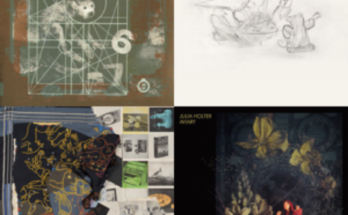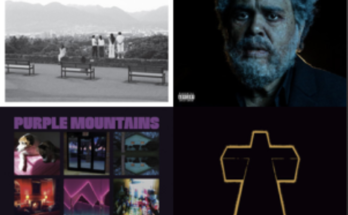With new albums being released by the dozens every week, it is difficult to know where to look
for new music. And with covid vaccines getting into an increasing number of arms, the music
industry is starting to come alive again. This March saw the return of “Music’s Biggest Night” —
the Grammy Awards. However, it was in a strange form, with the ceremony taking the shape of
a prestigious dinner party only the most relevant could attend. Many other big names also
released music this March, between Drake, Selena Gomez, Justin Bieber, Bruno Mars and
Anderson Paak. So, here is a few albums that may have gone under your radar but are
definitely worth your time. I hope you enjoy what you pick out from this list as much as I do!
Genesis Owusu – Smiling With No Teeth
Song to hear: “I Don’t See Colour”

Genesis Owusu is an R&B and neo-soul artist from Australia, but it’s difficult to describe his music with just a genre or two. Owusu’s debut album, Smiling With No Teeth, travels a lot of ground sonically, ranging from smooth soulful cuts to aggressive hip hop bangers.
Accompanied with fresh and fun production, Owusu boasts an impressive range of vocal versatility. Even if some tracks start to lull, Owusu keeps the album engaging with his ability to channel a sweet falsetto one moment and a gruff, husky delivery the next. He carries a remarkable amount of charisma around these tracks, most striking on the opener “On The Move!” and mid-album highlight “I Don’t See Colour”.
Throughout Smiling With No Teeth, Owusu teams up with fellow Australian artist and oddball Kirin J Callinan. Callinan’s melodic and prickly guitars add a nice texture to a chunk of the songs here, namely “Don’t Need You,” “Drown,” and “Smiling With No Teeth.” While Callinan’s fingerprints are all over the whole album, the music is distinctly and organically Owusu’s.
Smiling With No Teeth may be a little uneven in its quality, but part of Owusu’s charm is the rough around the edges. Smiling With No Teeth is a very promising debut and showcases Owusu’s star potential. If you’re a fan of this kind of music or simply looking for a new exciting artist, check it out!
Floating Points, Pharoah Sanders, and the London Symphony Orchestra – Promises

Sam Shephard, also known as Floating Points, has been an interesting name in Britain’s electronic music scene over the past few years, garnering an increasing amount of attention over the past half-decade. With an eclectic sound and wide-ranging influences, Shepherd’s music is always evolving. However, his latest endeavor, “Promises,” is by far his most ambitious.
Written by Shephard and performed by the London Symphony Orchestra, the piece was then turned over to the legendary saxophonist Pharoah Sanders for him to do his thing. This incredibly improbable collaboration turns out to be a match made in heaven. Each collaborator compliments each other well. They all play sparingly, allowing the song to breathe and develop at its own pace.
Speaking of pace, “Promises” is quite the slow burn, truly reaching a climax only once or twice. Throughout the piece, a motif is repeatedly played by a harpsichord and some strings. It’s the audible embodiment of exploring somewhere long abandoned and wondrous, and it serves as the base for Shephard’s psychedelic electronics to sprawl and for Sanders’s grounded, earthly sax solos to soar.
“Promises” demands your attention and for those willing to dedicate it, it is supremely rewarding. It’s not something you can just hit play on while doing homework or playing a game, but perfect for a meditative walk or listening under the covers while staring at the ceiling. Check it out, as “Promises” is truly a once-in-a-lifetime collaboration on display.
Armand Hammer & The Alchemist – Haram
Song to hear: “Falling out the Sky”

Armand Hammer is a rap duo composed of underground stalwarts Billy Woods and Elucid. Both Woods and Elucid are renowned for their grim, dense wordplay. They take on the bleak realities of their lives and those around them with an unflinching sense of clarity and wit. Their lyrics are chock full of clever wordplay and dry humor. Throughout their incredibly consistent discography, they seem to have taken to heart the philosophy of letting no bar go to waste, and this project is as sharp as their music has ever been.
On Armand Hammer’s latest effort, Haram, Woods and Elucid have teamed up with the legendary producer, The Alchemist. The Alchemist is an incredibly adept producer, working prolifically with a multitude of different rappers from different scenes throughout the 21st century. The Alchemist’s range of capability is incredibly wide; he’s able to fit into many different pockets comfortably. On Haram, he attempts some of his creepiest, most off-kilter beats yet. His production is tasteful- textured yet restrained. It sets the stage for Woods and Elucid perfectly.
Throughout Haram, Armand Hammer continues exploring themes they’ve always rapped about, such as the evils of gentrification and capitalism. This time around, however, Woods and Elucid rap directly to the listener, posing rhetorical questions and knotty analyses, rather than leaning so heavily on the opaque storytelling that has characterized much of their previous work. It’s immensely analyzable and a thoroughly enjoyable album. Haram is highly recommended for any fan of underground hip hop.
Parannoul – To See the Next Part of the Dream
Song to hear: “Analog Sentimentalism”

Parannoul dreams of being a rockstar someday, but is ashamed at the idea of his parents knowing he even makes music at all. He laments not picking up the guitar until the age of 21, that he has a bad singing voice, and that he is “below average in height and appearance in everything.” And yet, Parannoul makes the sweeping indie rock music of his dreams. His second album, To See the Next Part of the Dream represents Parannoul’s escape from his struggles with inferiority, anxiety, and depression and his dream of achieving stardom.
Parannoul’s Bandcamp bio reads, “Just a student writing music in my bedroom.” Little else is known about the mysterious Seoul-based artist, but his position is one that many can empathize with. His music is reaching thousands similarly holed up in their rooms. To See the Next Part of the Dream is blowing up on the Bandcamp platform and is already being cemented as a cult classic.
To See the Next Part of the Dream is heavy, yet impossibly catchy, representing the dichotomy of Parannoul’s hazy, idyllic dreams and cruel, clear reality. Similarly, Parannoul’s guitars are often fuzzed-out and muddy, invoking a dreamy feeling. To contrast this, several acoustic guitars break up the haze with sharp clarity and melancholy chords. It’s rare for music to so deftly invoke a sense of wonder and despondency at the same time. No wonder Parannoul’s music is connecting with so many: To See the Next Part of the Dream achieves this relatable dejected feeling in spades, yet still retains the joy and excitement of discovering something new.
Lana Del Rey – Chemtrails Over the Country Club
Song to hear: “Chemtrails Over the Country Club”

Okay yeah, I know that the theme I set for this month is smaller artists and Lana’s popularity definitely surpasses that threshold. But Chemtrails Over the Country Club is easily one of the best albums of the month so I couldn’t make this list without mentioning it.
Chemtrails Over the Country Club is a step back from the grandiosity of Norman Fucking Rockwell; it’s a retreat into a quieter, folksier side of Lana. It may not quite scale the peaks of NFR, but her fascination with and analysis of American culture still provides a captivating perspective, even without the stakes of her best work.
The title track in particular captures Lana’s ethos perfectly. Set against a backdrop of a southern country club, the song creates an atmosphere of class and wealth, but hints at a clear and unmistakable unhappiness. The song is beautifully descriptive, setting a vivid scene physically, but leaving much of the story up to the imagination. Jack Antonoff’s production completes the mystical atmosphere the song creates. Among the organic and slight instrumentation, Lana’s voice floats in the mix, and the song creates a feeling of American universality. The whole album deserves your attention, but if you pick just one song to listen to, let it be that one.
Check out Brennen Thomas’s track-by-track breakdown here.




